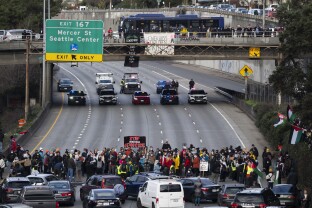After protesters of climate policy, police brutality and the war in Gaza blocked U.S. roads and construction projects in recent years, Republican politicians across the nation pushed harsh anti-protest laws — even some that could effectively grant immunity to drivers who strike demonstrators with their cars if they’re obstructing traffic.
In the year after the 2020 murder of George Floyd, Republican lawmakers at the state and federal levels introduced 92 anti-protest bills; the highest figure since The International Center for Not-for-Profit Law began tracking such laws in 2017. Eighty of the bills were blocked, including one at the federal level. But Republicans kept at it, introducing 37 bills in 2022 and 2023 in total, seven of them successfully (eight are still pending from last year).
Now, some GOP lawmakers are pushing for federal legislation that would penalize protests that block traffic on roadways. But despite widespread agreement within the party that this type of demonstration is a problem — and an effective rallying cry on the campaign trail — there’s no consensus on how to address it.
A bill currently pending in the Senate was introduced in December by Sens. Thom Tillis of North Carolina and Marsha Blackburn of Tennessee. The Safe and Open Streets Act would make it a federal crime to purposely block traffic on public roads and highways, punishable by a fine or up to five years in prison.
The legislation is a direct response to pro-Palestinian protesters who blocked roads in a number of cities to call for a ceasefire in the ongoing Israel-Hamas War. Tillis said he was motivated to introduce the bill by a demonstration in November in which a group stopped traffic on a busy Durham highway during rush hour to demand a ceasefire.
“They need to understand that they are closing eyes and plugging ears for people that may be objectively willing to listen to what they have to say,” Tillis told NOTUS. “If they want to make a difference, you don’t do it by laying in the middle of a damn interstate.”
Several North Carolina U.S. House members have joined Tillis in pushing the legislation to combat what Reps. Chuck Edwards called “radical protesters” who are “endangering the safety and livelihoods of our citizens.” He, along with Reps. Richard Hudson and David Rouzer, introduced a companion bill in the House two weeks ago, and Rouzer told NOTUS there is a lot of interest among others he has talked to in moving it forward.
But there’s also significant skepticism among some fellow Republicans.
“I have been in situations where I’ve seen ambulances blocked and stuff, but I need to know the specifics of the bill,” said Rep. Tim Burchett of Tennessee. “I’m very leery of going against protesters. The First Amendment is something I hold near and dear to my heart.”
He and other lawmakers said it’s already illegal within most states to obstruct traffic.
“I have questions about federalizing the issue,” said Rep. Dan Bishop of North Carolina. “So, I’m not necessarily drawn to that solution at first glance.”
Bishop, who is running for North Carolina attorney general, added that he thinks state attorneys general need to take more action against protesters who block traffic using state law.
Many Democrats agree that the matter is best addressed on the state and local levels.
“I am in Congress and so as a Congressman, I think we have more important issues than traffic,” said the Tennessee delegation’s only Democrat, Rep. Steve Cohen. “Traffic is something that the local city council deals with. Leave it to them.”
Sign up for daily updates from NOTUS.
For now, the legislation hasn’t been acted on in either chamber. The bills were referred to the Senate and House Judiciary committees, but neither has held hearings or markups on the matter. Still, Tillis believes the legislation can advance. Fellow GOP Sens. Ted Budd of North Carolina and Ted Cruz of Texas both say they are inclined towards the measure, and Tillis said others appear interested.
“It has been very well received by the conference members,” he said. “We’ve also gotten to talk to our Democratic colleagues.”
Tillis said that some Democratic mayors have even reached out to say, “This is actually a good idea,” although he did not name them.
He already has one potential supporter across the aisle: Pennsylvania Sen. John Fetterman, who went viral on X in November for waving an Israeli flag at protesters outside the U.S. Capitol while they demanded a ceasefire to the war. Fetterman said he was open to a federal law that penalized protesters who blocked roads.
“I do think there has to be some kind of a sanction if you’re willing to do those things,” Fetterman said. “It’s open to conversation, but I would just never support any protesters blocking tunnels, bridges, or anything like that, even if it’s a case I would agree on.”
—
Calen Razor is a NOTUS reporter and an Allbritton Journalism Institute fellow.
Sign in
Log into your free account with your email. Don’t have one?
Check your email for a one-time code.
We sent a 4-digit code to . Enter the pin to confirm your account.
New code will be available in 1:00
Let’s try this again.
We encountered an error with the passcode sent to . Please reenter your email.


